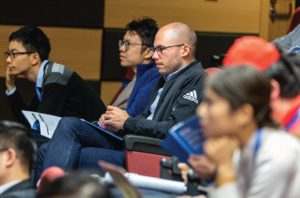By League of Education Voters Policy Team
We believe students come first. We are focused first and foremost on meeting the needs of every student.
We are dedicated to designing an equitable education system that serves all students based on their strengths, supports their needs, and provides the resources they need to be successful.
We are committed to working to close gaps experienced by historically and systemically underserved students— including students of color, students in poverty, students qualifying for special education services, students learning English, and students impacted by trauma. We believe this will lead to all students experiencing greater success and reaching their full potential.
PROBLEM
 18,000 State Need Grant eligible students attending Washington higher education institutions are not currently receiving a State Need Grant because the program has not been fully funded by the legislature.
18,000 State Need Grant eligible students attending Washington higher education institutions are not currently receiving a State Need Grant because the program has not been fully funded by the legislature.
OPPORTUNITY
The legislature established the State Need Grant (SNG) fifty years ago to increase access to higher education for low-income students. Although the SNG annually funds almost 70,000 students, the underfunding of SNG left 18,000 eligible low-income students unserved in each of the last seven years.
Over ten years ago, Washington established the College Bound Scholarship that provides financial aid to students from income-eligible families who sign a pledge in middle school that they will earn a GPA of 2.0 or higher in high school and have no felony convictions (1).
Both programs cover a portion of the cost of attendance leaving students to cover the rest of the costs via family contributions, loans, or jobs. As of 2012, the average SNG award covered 12% to 35% of the cost of attendance. On average, students cover between 14% and 28% of the cost through loans with the rest of the costs of attendance being paid through other types of aid or family and/or student-generated sources.
RESEARCH
Preliminary research by the Washington State Institute for Public Policy indicates the State Need Grant has positive impacts on student enrollment and completion (2). The same study also estimated that a decrease in the SNG award of 25% ($600 for two-year institutions and $2,000 for four-year institutions) would result in a decline in persistence of 2% – 4% and a reduction of completion by 5% – 8%.
Both the State Need Grant and College Bound Programs are helping to reduce barriers to postsecondary education for low-income students, particularly students from historically marginalized communities. Early indications also show a range of positive impacts from participation in the College Bound Scholarship Program.
Initial findings show College Bound students are more likely than other low-income students to enroll in postsecondary education and to complete the needed courses to meet the minimum four-year college admission requirements in Washington (3).
Fully funding the State Need Grant and expanding access to College Bound will reduce the opportunity gap for low-income and historically marginalized students, and continue to build a more equitable education system.
SUCCESS STORY
Through College Success Foundation: Aubrieann Hale is a foundation alumna studying for a social work degree at Central Washington University. In addition to her financial-aid package, Aubrieann works two part-time jobs — one as a College Success Foundation peer mentor — and receives a student loan. “If I didn’t have the State Need Grant, there is no way I’d be the first in my family to attend college and earn a degree. It’s so important to me to get my degree in social work so that I can help better my community and those who really need help, like I did,” she said. “My parents make very little money and struggle with illness, so I would be at such a loss if it weren’t for financial aid allowing me to pursue my dream.”
LOOKING AHEAD
In 2019, League of Education Voters recommends:
- Continuing to expand access to postsecondary opportunities through the State Need Grant and College Bound Scholarship.
NOTES
1. “Fulfill the College Bound Pledge,” Ready Set Grad (WSAC) website
2. The Effectiveness of Washington’s State Need Grant Program: Final Evaluation Report, Washington State Institute for Public Policy, January 2014.
3. Chen, Vivien, A Longitudinal Profile of State Need Grant Recipients’ Educational Progress and
Degree Completion, Educational Research & Data Center, 2017.
2019 Legislative Priority Issue Brief: Access to Postsecondary Opportunities (PDF)
Listen to our podcast interview with Highline College student Chalisa Thompson on the Umoja Black Scholars Program
Read our 2019 Legislative Priorities
Love what we do? Support our work
Want to find out the latest in education news in Washington? Subscribe to our newsletter
Want to learn more about League of Education Voters? Find out here